Watch our Executive Director Chris Coulter at the Munich Security Conference!
Watch our Executive Director at #MSC2026!
Our Library
Explore our publications, from research papers and series to educational materials, covering all aspects of conflict transformation and peace promotion.
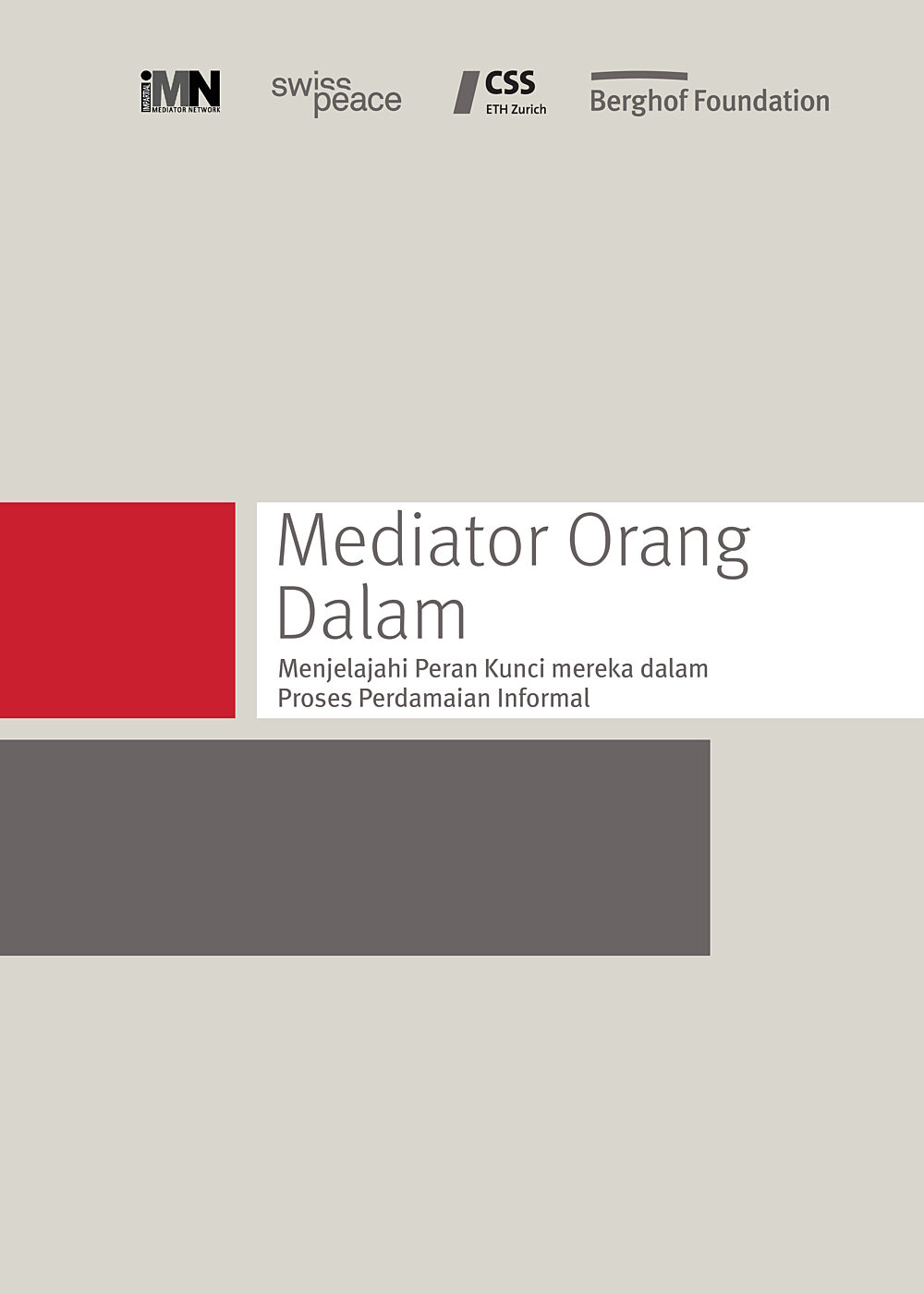
Mediator Orang DalamMenjelajahi Peran Kunci mereka dalam Proses Perdamaian Informal
Laporan ini menyoroti salah satu pelaku kunci dalam proses perdamaian: mediator orang dalam. Dasar laporan ini adalah pengalaman bahwa sebagian besar proses perdamaian resmi dimulai atau dilengkapi oleh proses informal, yang kerap difasilitasi oleh orang-orang dari daerah konflik, yang memiliki pengetahuan mendalam dan dedikasi besar untuk menyelesaikan konflik.
Untuk mengeksplorasi peran spesifik, potensi dan batasan mediator “orang dalam” lokal dan regional dalam proses perdamaian saat ini, Berghof Foundation for Peace Support (BPS) bekerja sama dengan Mediation Support Project dari Swisspeace/CSS-ETH Zurich mengundang belasan mediator orang dalam dari berbagai bagian dunia (Algeria, Burundi, Kongo, Jerman, Kenya, Kyrgyzstan, Makedonia, Mali, Meksiko, Nepal, Filipina, Sri Lanka, Swiss dan Uganda).
- Year2016
- Author(s)Simon Mason
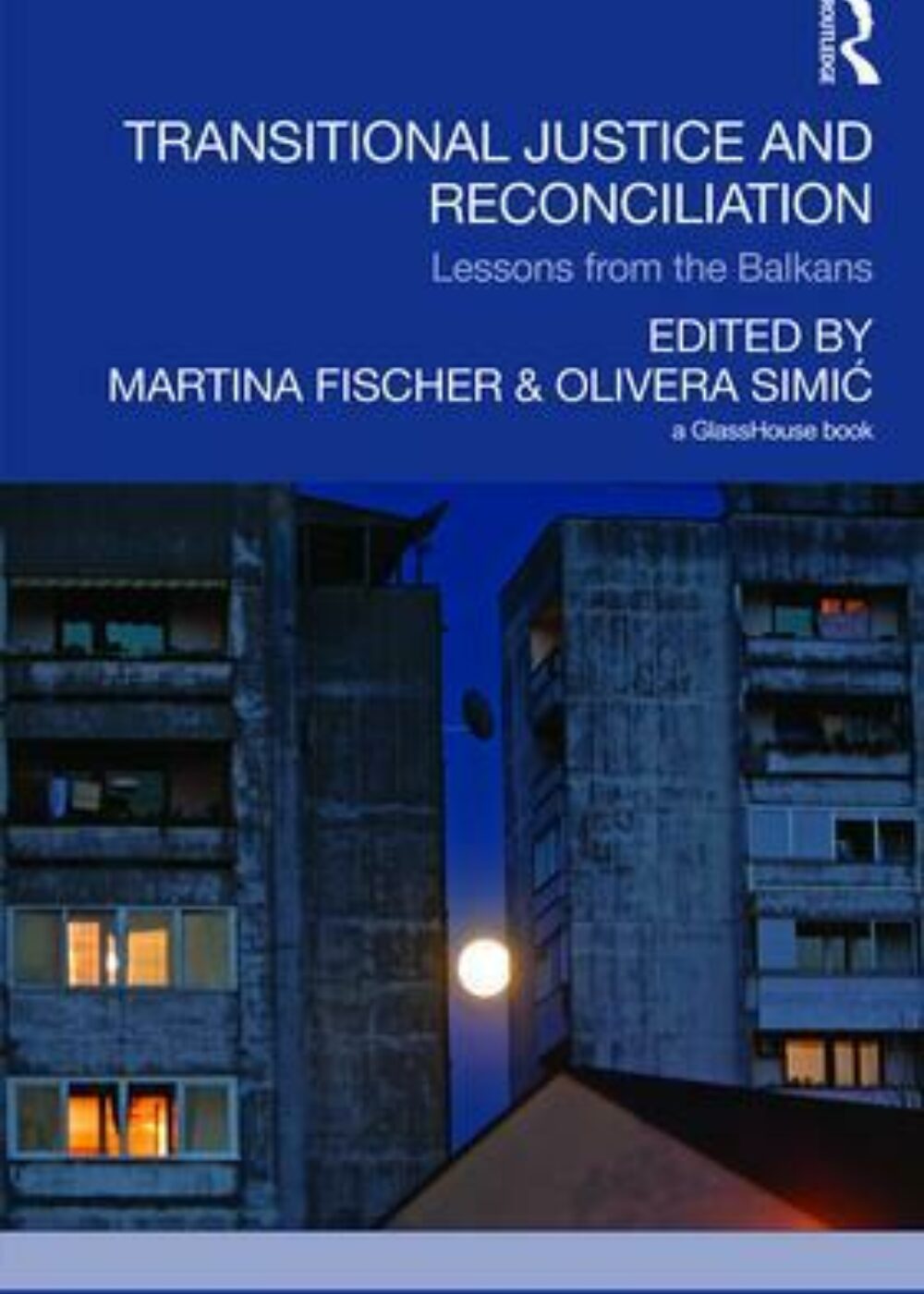
Transitional Justice and ReconciliationLessons from the Balkans
The book presents empirical studies, theoretical discussions, and practical experience from initiatives for dealing with the past in the region of former Yugoslavia. It engages scholars and practitioners from the region, as well as international experts, to reflect on the achievements in transitional justice and obstacles that characterise efforts to deal with the past. Drawing variously on empirical studies, theoretical discussions, and practical experience, their contributions offer invaluable insights into the complex relationship between transitional justice and conflict transformation.
- Year2016
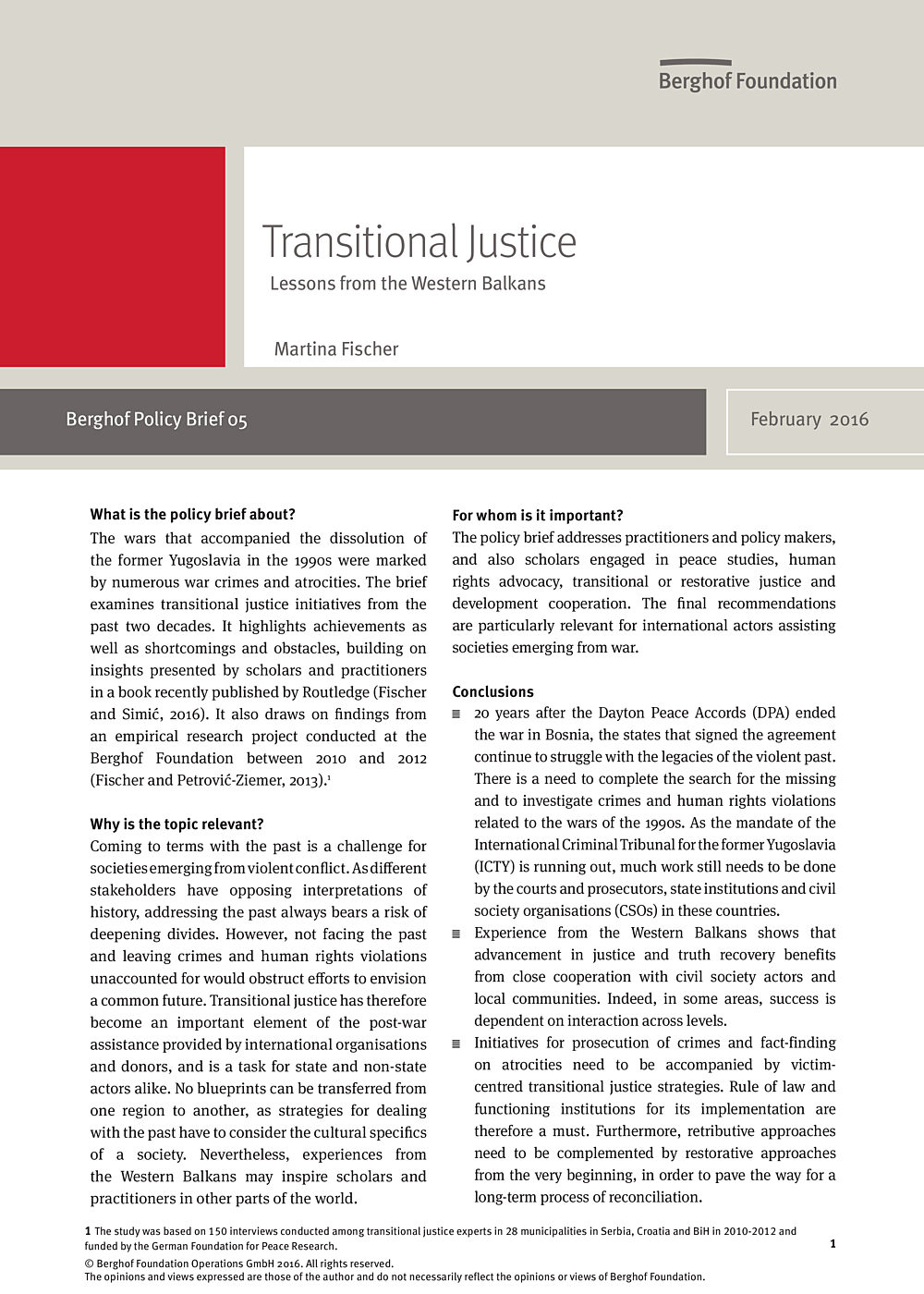
Transitional Justice: Lessons from the Western BalkansPolicy Brief No. 5
The policy brief examines different approaches and initiatives for transitional justice and reconciliation that have been implemented since the Dayton Peace Accords (DPA) ended the war in Bosnia in 1995. It highlights achievements and innovative approaches in processes of dealing with the past as well as shortcomings and obstacles for reconciliation.
- Year2016
- Author(s)Martina Fischer
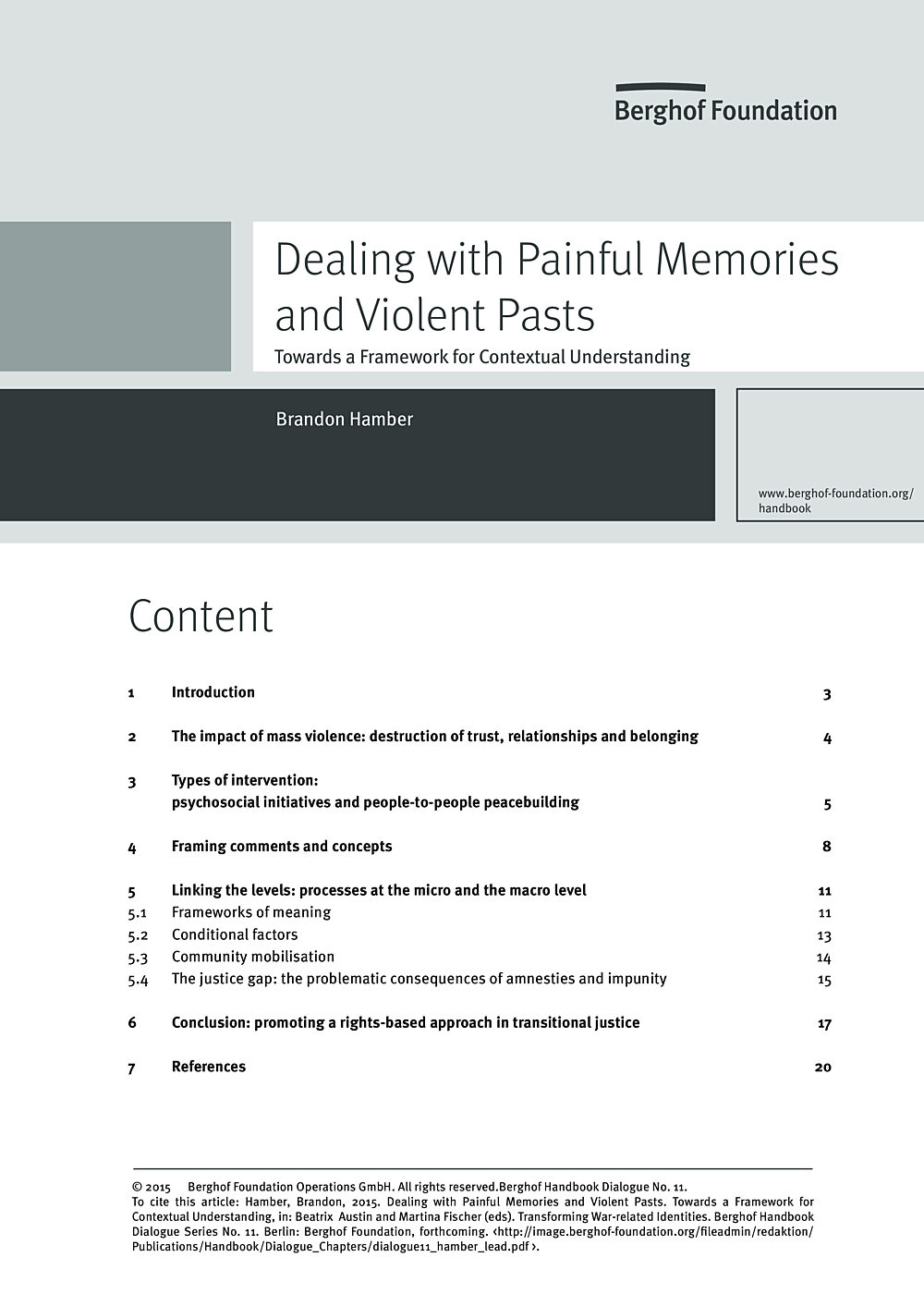
Dealing with Painful Memories and Violent Pasts. Towards a Framework for Contextual UnderstandingHandbook Dialogue Series No. 11 - lead article
Reflects on the role of different approaches for dealing with painful memories and violent pasts. The author explores how different dimensions – interpersonal and intergroup relations, memories and identities at the individual and collective level – relate to one another. He also addresses how one can constructively address victim identities and cultures of victimhood that may stem from painful or traumatic experiences in light of his work in South Africa and Northern Ireland, among other locales.
- Year2015
- Author(s)Brandon Hamber
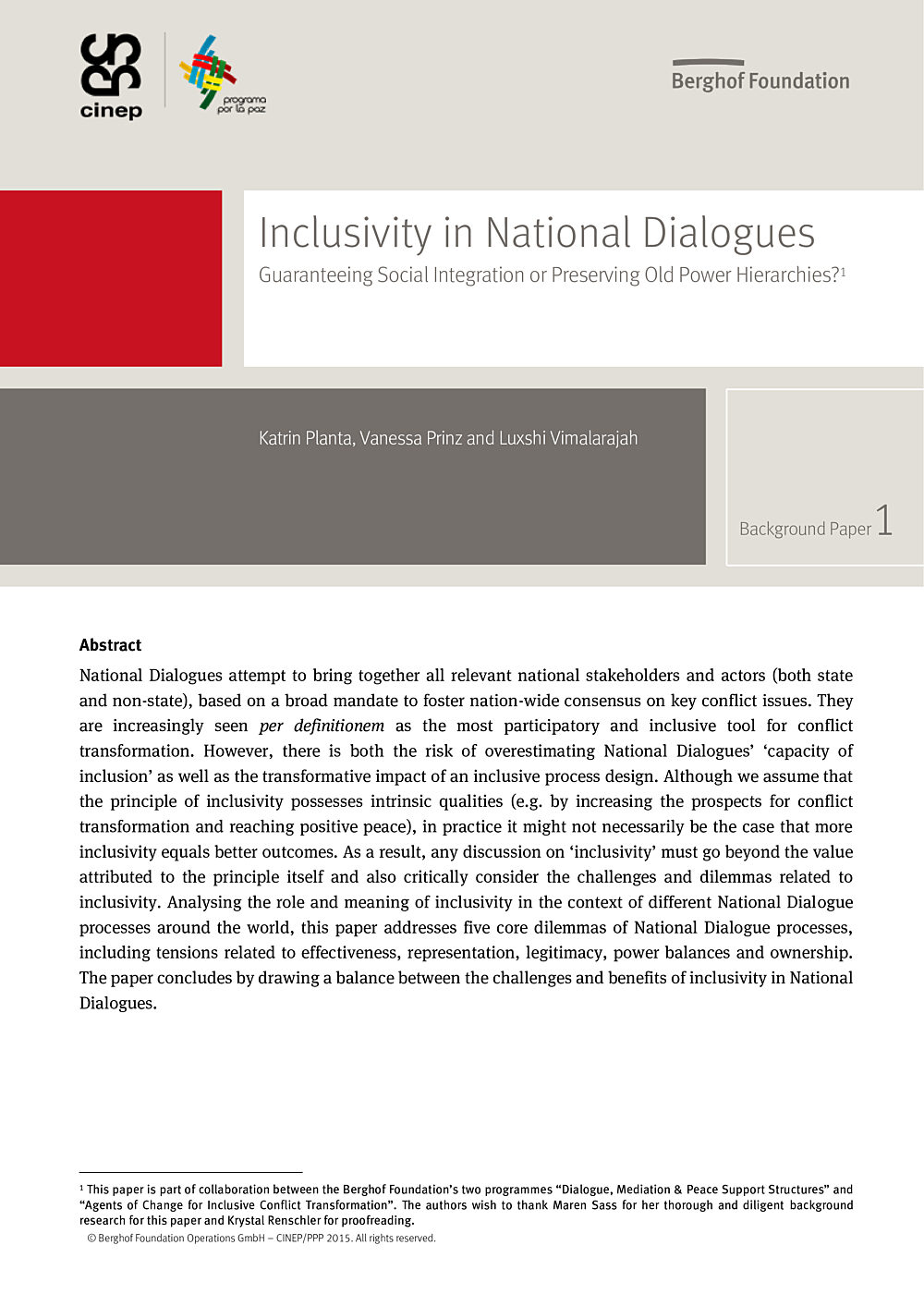
Inclusivity in National Dialogues: Guaranteeing Social Integration or Preserving Old Power Hierarchies?IPS Paper No.1
Analysing the role and meaning of inclusivity in the context of different National Dialogue processes around the world, this paper addresses five core dilemmas of National Dialogue processes, including tensions related to effectiveness, representation, legitimacy, power balances and ownership.
The paper concludes by drawing a balance between the challenges and benefits of inclusivity in National Dialogues.
- Year2015
- Author(s)Katrin Planta, Vanessa Prinz, Luxshi Vimalarajah
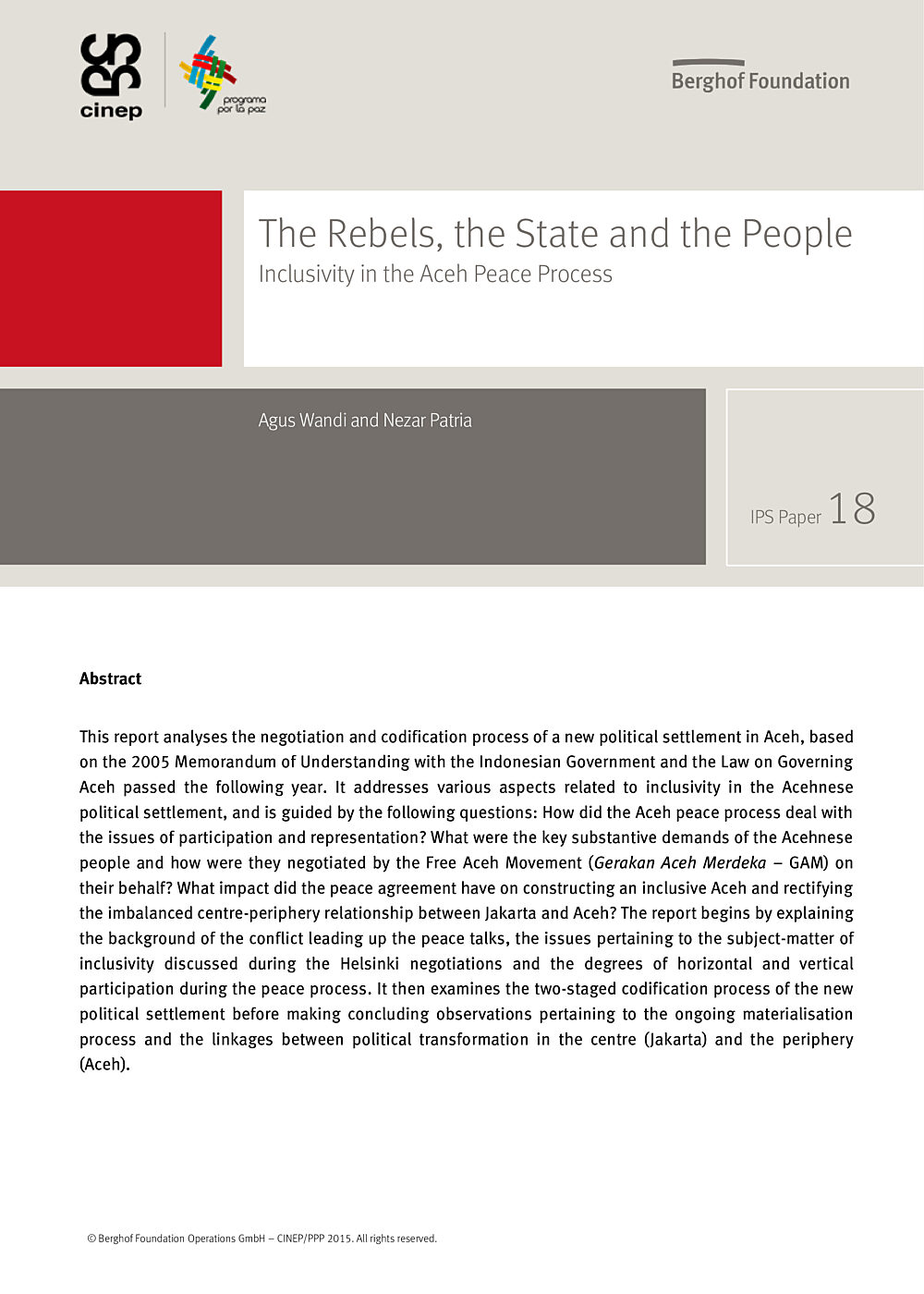
The Rebels, the State and the People: Inclusivity in the Aceh Peace ProcessIPS Paper No. 18
This report analyses the negotiation and codification process of a new political settlement in Aceh, based on the 2005 Memorandum of Understanding with the Indonesian Government and the Law on Governing Aceh passed the following year. It addresses various aspects related to inclusivity in the Acehnese political settlement, and is guided by the following questions: How did the Aceh peace process deal with the issues of participation and representation? What were the key substantive demands of the Acehnese people and how were they negotiated by the Free Aceh Movement (Gerakan Aceh Merdeka – GAM) on their behalf? What impact did the peace agreement have on constructing an inclusive Aceh and rectifying the imbalanced centre-periphery relationship between Jakarta and Aceh?
- Year2015
- Author(s)Agus Wandi, Nezar Patria
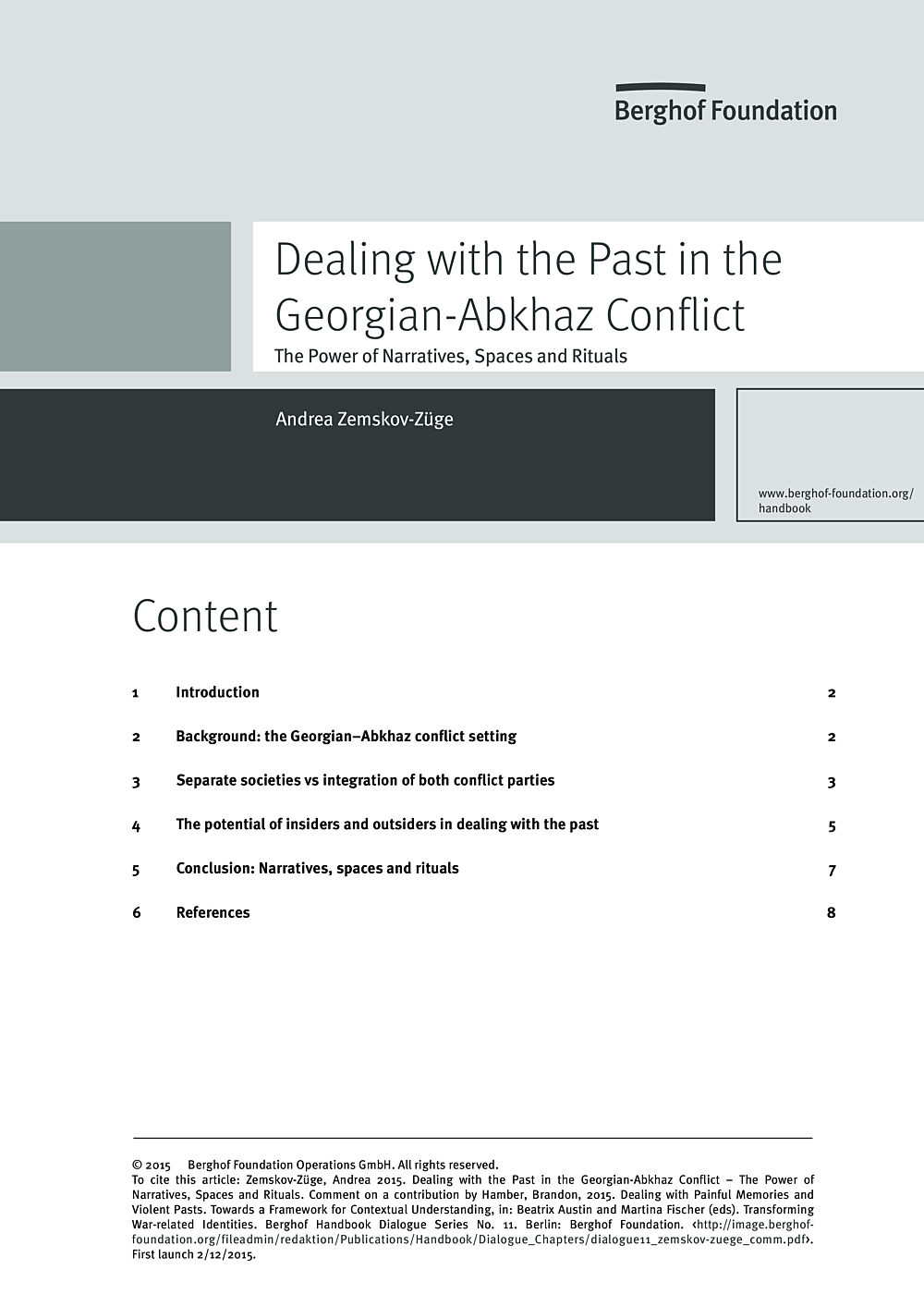
Dealing with the Past in the Georgian-Abkhaz Conflict: The Power of Narratives, Spaces and RitualsBerghof Handbook Dialogue Series No. 11 - comment
Brandon Hamber’s essay addresses two important questions: “What is the role of different approaches for dealing with painful memories and violent pasts?” and “How do the different dimensions – interpersonal and intergroup relations, memories, and identities at the individual and collective level – relate to one another?” (Hamber 2015, 2). These questions open up a universe of additional topics related to the cultural context, societal preconditions and obstacles to dealing with the past in post-war societies. I read his remarks against the background of my field of work in the South Caucasus. Here I engage as a historian, having specialised in Soviet and post-Soviet war memory, and as a dialogue practitioner striving to make use of scientific concepts and findings for establishing a sound and resilient peacebuilding system in the region.
- Year2015
- Author(s)Andrea Zemskov-Zuege

الوسطاء الداخليوندراسة حول استكشاف دورهم الرئيسي في عمليات السالم غير الرسمية
يسـلط هـذا التقريـر الضـوء علـى مجموعـة رئيسـية مـن األطـراف الفاعلـةُ ّعـد هـذا التقريـر بنً ـاء علـى فـي عمليـات السـام: الوسـطاء الداخلييـن. وقـد أ الخبـرة المكتسـبة أن أغلـب عمليـات السـام الرسـمية قـد بـدأت مـن خـالُ لحقـت بهـا، وقـام أنـاس متفانـون مـن مناطـق عمليـات سـام غيـر رسـمية أو أ الصـراع وعلـى معرفـة متعمقـة بـه بتسـهيل عمليـات السـام تلـك. مــن أجــل استكشــاف الــدور المحــدد للوســطاء "الداخلييــن" المحلييــن واإلقليمييــن فــي عمليــات الســام الحاليــة، قامــت مؤسســة بيرغهــوف، بالتعـاون مـع مشـروع دعـم الوسـاطة التابـع لمؤسسـة السـام السويسـرية ومركــز الدراســات األمنيــة )CSS )فــي المعهــد السويســري الفيدرالــي للتكنولوجيــا ETH بزيوريــخ، بدعــوة مجموعــة مــن الوســطاء الداخلييــن مــن مختلــف أنحــاء العالــم )الجزائــر، بورونــدي، جمهوريــة الكونغــو الديمقراطيــة، ألمانيــا، كينيــا، قيرغيزســتان، مقدونيــا، مالــي، المكســيك، نيبــال، الفلبيــن، ســريالنكا، سويســرا وأوغنــدا(.
- Year2015
- Author(s)Simon Mason
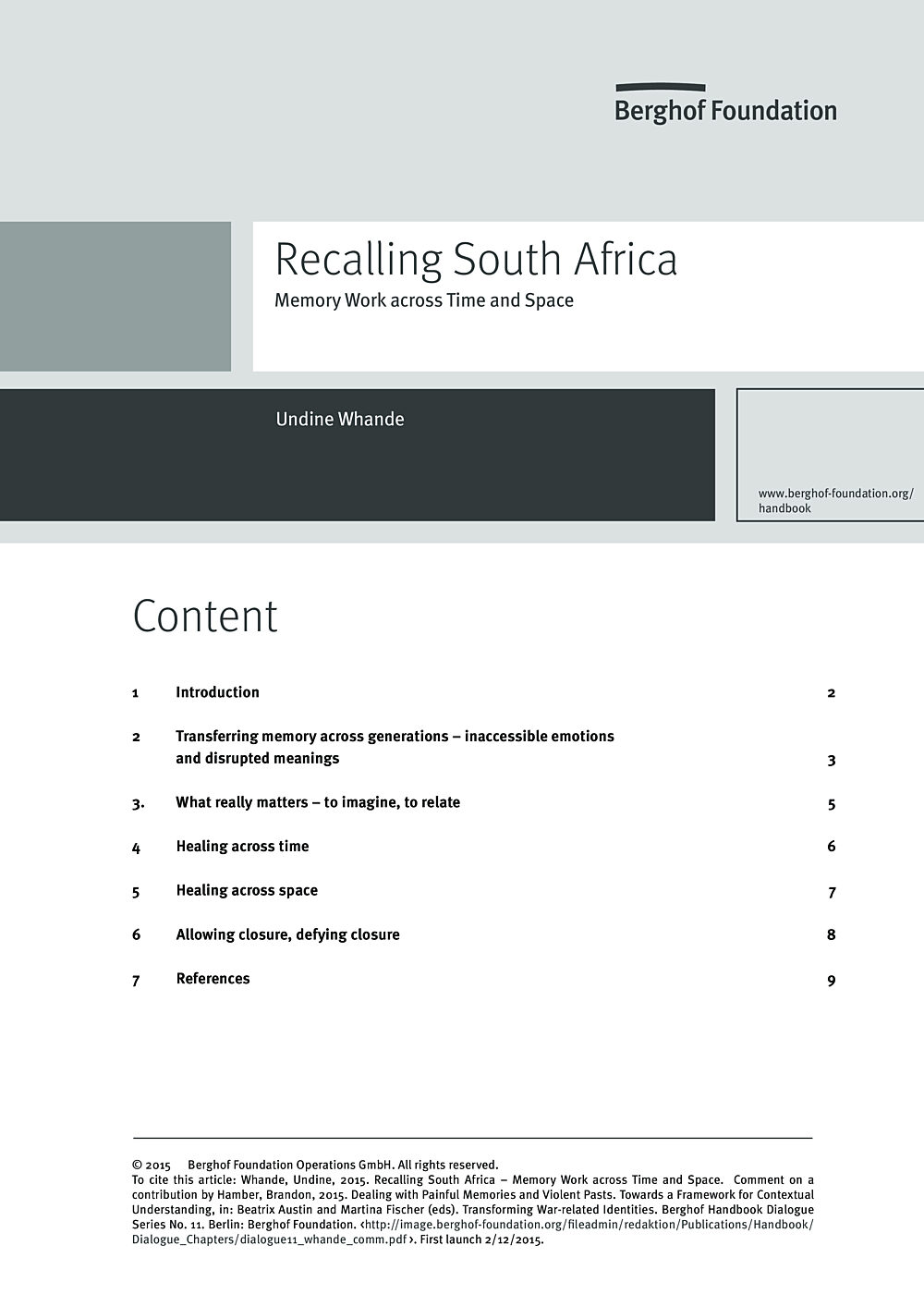
Recalling South Africa – Memory Work across Time and SpaceBerghof Handbook Dialogue Series No. 11 - comment
I remember well the time of the Truth and Reconciliation Commission (TRC). I had come to South Africa a few months before the start of the first hearing, as a “bright-eyed and bushy-tailed” twenty-something enthusiastic about witnessing and partaking in this time of transformation in the country. At that time I only knew South Africa from my youthful times of rebellion in the German anti-apartheid movement. I loved the sincerity and courage with which South Africans approached the task, even though it was clear from the start that this would be a tremendously painful exercise. I recall going to one of the first hearings of the TRC and being warmly welcomed when I shared my interest in memory work based on my experience of having led youth exchange visits to concentration camps in Poland and inter-generational dialogue projects in Germany.
- Year2015
- Author(s)Undine Whande
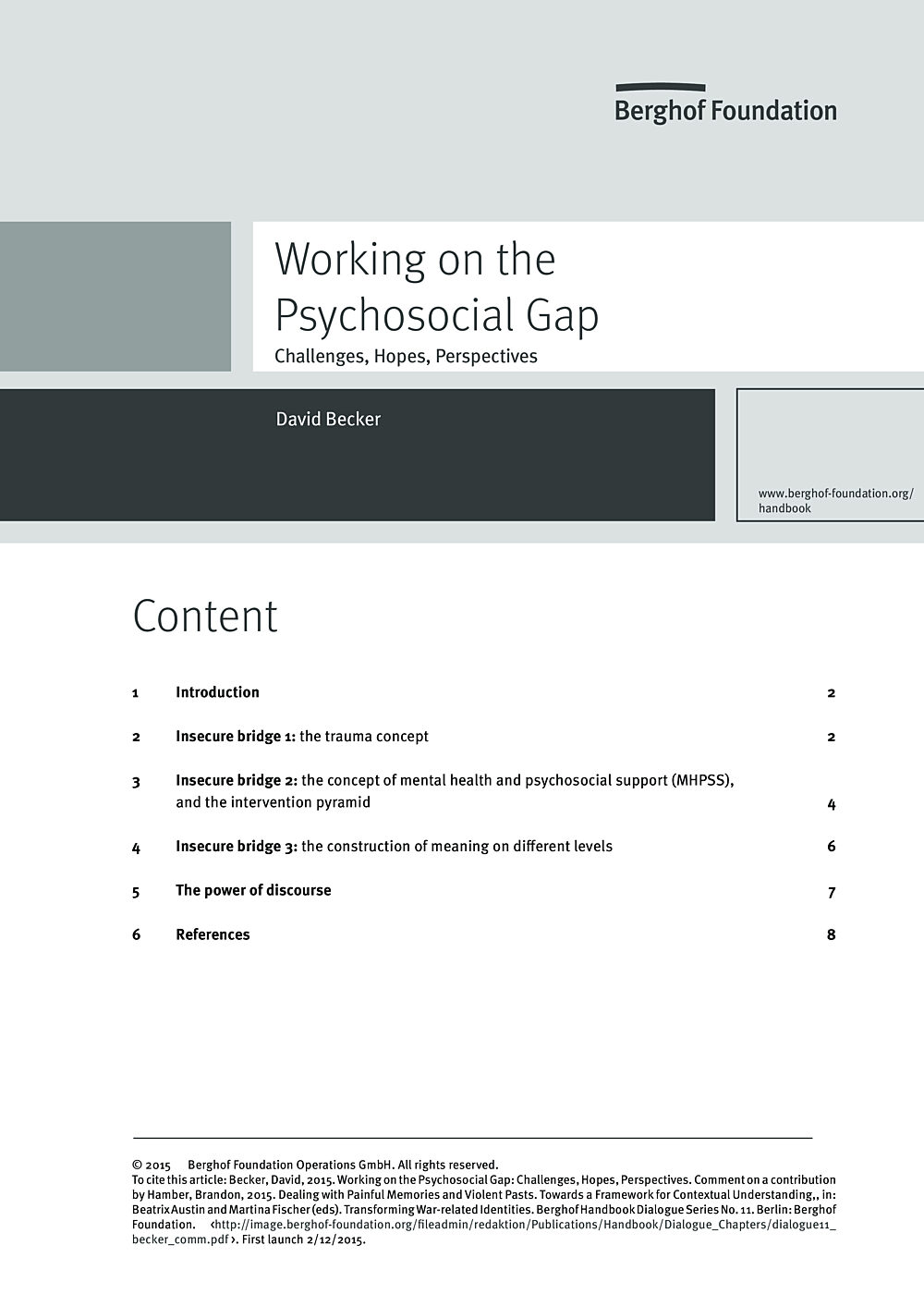
Working on the Psychosocial Gap: Challenges, Hopes, PerspectivesBerghof Handbook Dialogue Series No. 11 - comment
In his scholarly article, “Dealing with painful memories and violent pasts”, Brandon Hamber explains and reflects on “the relationship between how individual (largely victim) processes of coming to terms with mass atrocity (a micro perspective) relate to the collective or political process of finding ways of dealing with the past (a macro perspective)” (Hamber 2015, 2). In any discussion of war, mass atrocities, political repression and their impact, one is unavoidably forced to think about this relationship and deal with it – to confront the challenge of having to talk about both perspectives without being able to fully integrate them or grasp their linkage in all its complexity. Hamber does a masterful job in confronting this inherent problem but inevitably succumbs, at least in part, to the impossibility of the task. The reason for this might be what I call “the psychosocial gap”, and I believe this needs closer examination.
- Year2015
- Author(s)David Becker